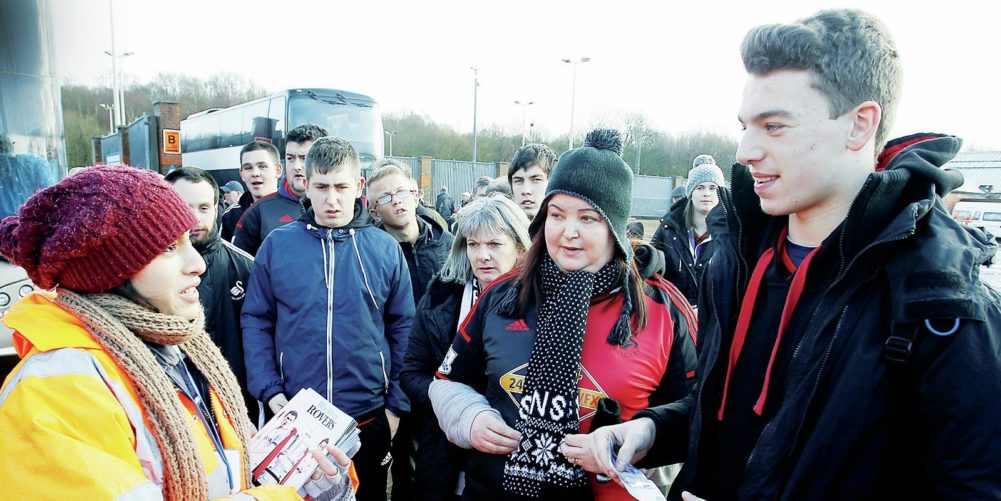Mark HARRIS
NORTHERN PREMIER LEAGUE CHAIRMAN

“The best way to find yours elf is to lose yourself in the service of others.”
– Gandhi
Amidst all the mis-guided optimism around the Crouch Review, the biggest challenge facing Non-League football barely warranted a mention.
Namely the reliance of NLS clubs on volunteers to perform every task bar playing and management, up to and including the boardroom.
If you were to offer the average club chair the option of ten extra volunteers or £10,000 cash, I reckon most would take the volunteers.
That’s because having the right people in the most appropriate roles will generate the income. They will also last a lot longer.
In the same way, it is people, rather than funding that presents our level of the game with its greatest ongoing challenge – the recruitment and retention of volunteers to keep our clubs going. Recent FA research found that all three Trident Leagues – 91 per cent of NPL, 86 per cent of Isthmian and 90 per cent of Southern League clubs – need urgent help in this area.
“We make a living by what we get. We make a life by what we give.”
– Winston Churchill
Although there are many obstacles to recruitment, one look at most clubs’ volunteers confirms we are struggling to find the next generation of turnstile operators, programme sellers and ground staff. And when you consider the average club has around 30 roles filled by volunteers, the true extent of the risk becomes clear.
Of course, some roles are harder to fill than others. For example, the role of Club Secretary requires either an understanding or experience of football administration, rules, and regulations.
Mistakes usually prove costly so, whilst rewarding, the pressures in terms of paperwork, compliance and sheer workload make a good Club Secretary at least as valuable as a good goalkeeper.
We are already seeing the professionalism of the secretary role with the appearance of more CEOs at Steps 3 and 4.
In roles such as Safety Officer or Diversity Lead, a DBS check is essential, as is the relevant skill set, which applies to commercial, media or any specialist volunteer role.

Traditionally, all you had to do was pick up a yellow jacket on a matchday and you were a steward. Today, grounds that require safety certification demand, and most that don’t increasingly opt for, stewards with some form of accreditation. The risk to life, limb, and the solvency of a football club of not taking stewarding seriously is immense.
Another barrier to volunteer recruitment, frequently heard, is time availability.
Clubs are having to recruit extra volunteers to fill in when others are unavailable.
“Every person can make a difference, and every person should try.”
– John F. Kennedy
However, the greatest barriers of all are that too many potential volunteers don’t know what volunteering opportunities are available, or what they involve. Too many clubs fail to publicise their volunteering opportunities beyond their existing supporter base.
It’s not as if there isn’t a serious demand for volunteer roles – 23 per cent of people aged 16 and over in England took part in formal volunteering at least once a month in the year ending March 2020.
That’s over 15 million people. And yet, in 2019, an estimated 400,000 people regularly give up their time every week to keep the 37,000 football clubs in England operating. That means football is attracting just 0.2 per cent of potential volunteers.
There’s also an ethnicity issue that cannot be ignored. Asian people are consistently less likely to volunteer than white or black people, according to government figures.
The Crouch Review highlights the need for work to be done to encourage greater diversity in our clubs. It’s just the right thing to do.
“Life’s most urgent question is, what are you doing for others?”
– Martin Luther King, Jr
So, what is football doing about it? The FA has launched a volunteering campaign called ‘Pitching In’, which is coincidentally the name of the name of the community initiative sponsoring all three Trident Leagues.
Interlinked with the FA’s Diversity, Equality and Inclusion and Club Consultants Programme initiatives, the FA Volunteering Strategy will initially focus on club secretaries.
This is complemented by another joint initiative between the three Trident Leagues and our sponsors Entain which sets out to create a mechanism through which Trident clubs could attract more volunteers for all roles.
Taking a maximalist approach, we are in the process of creating an online portal, the Pitching In Volunteer Hub, which explains the range of volunteering opportunities available at Trident clubs, and what they entail.
The Hub will also allow Trident clubs to advertise specific volunteering opportunities via League and club social channels and websites, using video case studies, webinars and display material across Entain’s Ladbrokes and Coral shops.
A working group has been set up involving the three Leagues and our sponsors to develop a solution that can be put in place before next season. I believe that, by co-ordinating this initiative with the other FA programmes already in place, this could be a game-changer for our clubs.
If anyone still believes that a penny of football’s wealth will be seen at Steps 3 or below, they are delusional. We may, by working with the bodies concerned, see monies channelled down via the Football Foundation, but this income will only be available to clubs with the appetite and ability to improve their facilities.
If we want to generate more money for the National League System, as things stand the unpalatable truth is that we are on our own.
And that means attracting the skills and resource to find the money that is critical to moving Non-League football forward.
FOLLOW THE NLP ON TWITTER @NONLEAGUEPAPER
























